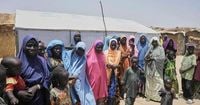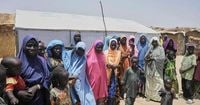Nigeria’s military announced on Saturday that it had carried out a series of precision airstrikes in the country’s northeast, killing at least 35 Islamic militants in Borno state. The operation, conducted on August 23, 2025, targeted four separate locations in the area of Kumshe, which sits close to the border with Cameroon. The strikes mark the latest in a long-running battle against insurgency in Africa’s most populous nation—a struggle that has cost tens of thousands of lives and uprooted millions more.
According to Ehimen Ejodame, spokesperson for the Nigerian Air Force, the militants had gathered in Kumshe after attempting attacks on ground troops stationed in the region. The military’s response was swift and decisive. “Following the operation, communication was re-established with ground troops, who confirmed that the situation around their location had been stabilized,” Ejodame stated, as reported by the Associated Press. For soldiers on the ground, the air cover provided a crucial lifeline, halting the insurgents’ momentum and restoring a sense of security, at least for now.
This latest escalation comes against the backdrop of Nigeria’s persistent struggle with jihadist violence, especially in the northeast. The region has long been a stronghold for Boko Haram, a homegrown extremist group that first emerged in 2009. The group’s stated aim was to fight Western education and impose a radical interpretation of Islamic law. Over time, Boko Haram’s campaign of terror has evolved, with the group earning a grim reputation as one of the world’s deadliest armed organizations.
But Boko Haram is no longer the only threat. In recent years, a splinter group known as the Islamic State West Africa Province (ISWAP) has risen to prominence. ISWAP, which aligned itself with the global ISIS network, has become notorious for targeting military installations and overrunning bases in northeastern Nigeria. The rivalry between Boko Haram and ISWAP has added a dangerous new layer of complexity to the conflict, making it harder for the Nigerian government to stamp out militancy once and for all.
The human cost of this war is staggering. According to United Nations estimates cited by the Associated Press, around 35,000 civilians have lost their lives since the conflict began, while more than 2 million people have been displaced from their homes. Entire communities have been uprooted, their futures thrown into uncertainty. The violence has not been confined to Nigeria’s borders, either. The conflict has spilled over into neighboring countries such as Niger and Cameroon, threatening regional stability and complicating international efforts to contain the crisis.
President Bola Tinubu’s government has made curbing jihadi attacks a top priority, but progress has been slow and uneven. Despite repeated military offensives and promises of reform, the insurgency in the northeast continues to simmer. The government’s challenges are not limited to jihadist groups, either. Armed gangs—often referred to as “bandits”—have wreaked havoc in Nigeria’s north-central and north-west regions, carrying out kidnappings, raids, and other violent acts that further strain the country’s security forces.
The airstrikes in Kumshe represent a tactical victory for the Nigerian military, but they also underscore the enduring nature of the threat. For many Nigerians, each new operation brings a mix of relief and resignation: relief that the military is taking action, and resignation that the underlying problems remain stubbornly unresolved. The question on everyone’s mind is whether these gains can be sustained—or whether the militants will simply regroup and return.
For ground troops operating in hostile territory, the airstrikes provided much-needed support. After the operation, communication lines that had been disrupted by the militants’ advance were restored, allowing commanders to confirm that their positions were once again secure. This immediate stabilization was a crucial outcome, as it prevented further loss of life and allowed the military to regain the initiative.
Borno state, the epicenter of the conflict, has witnessed some of the most intense fighting in Nigeria’s recent history. The area around Kumshe, in particular, has become a flashpoint due to its proximity to international borders and its strategic importance for both Boko Haram and ISWAP. Militants have used the region as a staging ground for attacks, exploiting the porous borders to move fighters and supplies with relative ease.
The Nigerian Air Force’s use of precision-guided munitions reflects a broader shift in military strategy. Rather than relying solely on ground assaults, the military is increasingly turning to airpower to target insurgent strongholds. This approach aims to minimize collateral damage while maximizing the impact on militant groups. However, experts caution that airstrikes alone are unlikely to bring lasting peace. The roots of the conflict—poverty, unemployment, and political marginalization—run deep, and addressing them will require more than military might.
Despite the government’s efforts, armed violence remains a daily reality for millions of Nigerians. In the northeast, civilians live under the constant threat of attack, while in other regions, criminal gangs exploit weak law enforcement to carry out their own reign of terror. The combination of jihadist insurgency and rampant banditry has stretched Nigeria’s security apparatus to its limits, prompting calls for international assistance and greater regional cooperation.
Observers note that each successful military operation brings a temporary sense of relief, but the cycle of violence soon resumes. The displacement of more than two million people has created a humanitarian crisis, with many forced to live in overcrowded camps or seek refuge across borders. Aid agencies warn that the situation could worsen if the conflict continues unabated, placing even greater strain on already fragile communities.
For now, the military’s victory in Kumshe stands as a testament to its determination and resilience. But as history has shown, the fight against Boko Haram, ISWAP, and other armed groups is far from over. The path to lasting peace will require not only continued vigilance on the battlefield but also a renewed commitment to addressing the social and economic grievances that fuel extremism in the first place.
As Nigerians reflect on the events in Borno state, the hope is that this latest operation marks a turning point—one that leads to greater security, stability, and a brighter future for all who have suffered through years of violence and upheaval.


